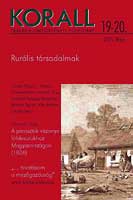Alkalmazkodó polgárosodás: a paraszti társadalom átalakulásának egy lehetséges útja a 20. század folyamán. A kiskanizsai „sáskák” példája
Adaptive bourgeois transformation: a possible avenue of the transformation of peasant society in the 20th century.The example of the “locusts” of Kisk
Author(s): Ágnes MolnárSubject(s): History
Published by: KORALL Társadalomtörténeti Egyesület
Keywords: Hungary; social history;20th century; county Zala; social stratification; peasants; economy; agricultural markets; social status; Kiskanizsa
Summary/Abstract: The paper focuses on and summarizes the principal idea of its author’s PhD thesis, while reflecting on the dispute about the peasantry that has once again intensified since the completion of the thesis and adding a number of new research results. The paper analyzes the 20th century changes in Kiskanizsa’s society in the context of the discourse of the bourgeois transformation of the peasantry both in the period between the two World Wars and during the time of socialism, as well as following the change of political system. The reason for this is that the strong sense of identity of the gardening “locusts” of Kiskanizsa is strongly determined by their achievements in adapting to the market economy. Despite this, however, entrepreneurship in agriculture has only begun to emerge during the last one and a half decades, and only within a narrow and increasingly professional group of gardeners. As regards the previous – socialist – period we may only speak of bourgeois transformation if we take into account those economic and social processes that go beyond agriculture. It is this viewpoint that makes it apparent that small-scale agricultural production is only a tool to open up the way toward the acquisition of other forms of (economic and cultural) capital. That is, the attempts to reach bourgeois status are achieved outside of the sphere of agriculture and, moreover, by the use of such tools as cannot be termed capitalist, which is why the process is coined as ”adaptive bourgeois transformation”.
Journal: Korall - Társadalomtörténeti folyóirat
- Issue Year: 2005
- Issue No: 19-20
- Page Range: 190-217
- Page Count: 28
- Language: Hungarian

